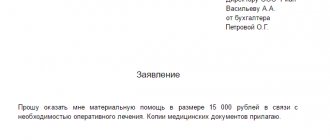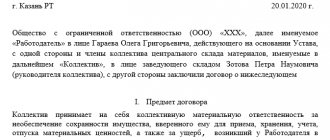In accordance with current labor legislation, the employee is obliged to compensate the employer for the damage that he caused to him through his actions or inaction.
Damage is assessed in terms of the actual decrease in the employer’s available property, as well as the deterioration in the condition of this property. The employer also has the right to recover from the employee the funds spent by the employer on restoring property or purchasing new ones. But he has no right to recover lost profits from the employee.
All employees of the enterprise bear financial responsibility, regardless of the form of ownership of the business. In Art. 233 of the Labor Code of the Russian Federation provides conditions, only in the presence of which the employee’s financial liability may arise. This:
- direct actual damage - a real decrease in the employer’s available property or deterioration in its condition, as well as the costs of restoring this property or purchasing new ones. This also applies to the property of third parties, which is in the custody of the employer, and he is responsible for it;
- unlawful actions or inaction of the employee, which led to damage;
- the presence of the employee’s fault;
- the presence of a cause-and-effect relationship between the damage and the employee’s behavior.
In what circumstances does the financial liability of employees not arise? In Art. 239 of the Labor Code of the Russian Federation lists the circumstances in the presence of which the employee’s financial liability is excluded:
- The first circumstance that excludes the employee’s financial liability is the presence of force majeure - that is, circumstances that a person cannot cope with. Force majeure refers to actions the occurrence and termination of which does not depend on the will of a person. This is a natural disaster, emergency situation, man-made or natural disaster, political events and phenomena;
- normal economic risk - the employee took all necessary measures to prevent damage and fulfilled his job duties. The main condition is that the employee is not at fault;
- financial liability is excluded in cases of extreme necessity - damage to the employer’s property was caused as a result of the elimination of circumstances that threatened the personality and rights of the employee. The employee tries to overcome circumstances of extreme necessity himself. For example, a bus driver cannot be held financially liable for his damages if they were received as a result of avoiding a collision with a person;
- exceeding the limits of necessary self-defense - harm was caused as a result of eliminating circumstances that threatened the life and health of both the employee and third parties. Necessary self-defense is a person’s actions aimed at repelling an offense committed by third parties. For example, during a robbery at an employer's office, a security guard hit the robber on the head with a chair, causing damage not only to the bandit's head, but also breaking the chair;
- failure by the employer to fulfill his obligations to preserve his property and the property entrusted to him, and failure to provide the necessary conditions for its safety. In this case, the employer will compensate for the damage himself. There must be a cause-and-effect relationship between the employer’s failure to fulfill his obligations and the damage caused. For example, an employer had a car stolen that was not kept in a garage or in a paid parking lot because the employer did not take care of it. Therefore, the driver will not be held responsible for this.
The obligation to prove that there are no circumstances leading to financial liability of the employee rests with the employer. If he does not prove this, then he will compensate for the damage to himself or a third party on his own.
Under what circumstances is an employee’s financial liability excluded?
As is known, the establishment of financial liability in relation to an employee must occur in strict accordance with the current rules, namely, with the provisions of labor legislation. Consequently, the exclusion of such liability should also be based on existing standards. Article 239 of the Labor Code of the Russian Federation contains information about special circumstances in which the employee will not actually bear financial responsibility. It should be noted here that the established list of such circumstances is not closed. This means that some other events may be added to it, depending on the specific situation. Each case must be considered by the employer on an individual basis.
If desired, the head of the organization will be able to create his own list of various additional circumstances under which the establishment of financial liability is excluded. The main thing is that such a list is formally formalized within the organization. For this purpose, a separate provision may be created by the authorized person, which includes all important information. Here it is necessary to pay attention to only one important nuance, namely, none of the specified circumstances in the position should violate the legal rights and interests of subordinates. Otherwise, the document created by the employer will be absolutely invalid.
Separately, attention should be paid to another important nuance, which is expressed in the need to prove a particular circumstance. That is, declaring its presence will not be enough. The interested party will need to provide appropriate evidence of the existence of such a circumstance. Such evidence can be expressed in a variety of materials, including documents, recorded statements of witnesses, video recordings, photographs, etc.
Exclusion of liability under force majeure circumstances
The presence of force majeure will always be a valid basis for the complete annulment of financial liability. However, here first it is necessary to accurately determine the meaning of such a concept. Force majeure is the occurrence of special circumstances that cannot be controlled by a person. The most striking example of force majeure, of course, can be called various natural phenomena - floods, earthquakes, etc.
However, it should be noted that force majeure does not always mean only various natural phenomena. In some cases, it can be expressed in completely different events. These include the introduction of martial law in the country, revolution, mass strikes, etc. Naturally, an employee cannot overcome such events. However, as mentioned above, the employer must still consider each case on an individual basis.
For example, much in a particular situation will depend on the specific period of time during which special circumstances were in effect. If the period was long enough, it means that the employee really had absolutely no opportunity to perform the required actions. If special circumstances were present for a very short time, it means that the employee will have to prove that he is right and that he is unable to influence such events.
In what cases is an employee exempt?
In Art. 239 of the Labor Code of the Russian Federation lists circumstances that preclude bringing an employee to financial liability.
These exceptional circumstances are:
- irresistible force;
- normal economic risk in labor law;
- extreme necessity or defense;
- failure by the employer to fulfill obligations to provide appropriate storage conditions to an authorized person.
If at least one of the specified circumstances occurs when damage is incurred, recovery from the financially responsible employee is excluded.
Let us consider in more detail each of the circumstances using specific examples.
Normal business risk - in what situations can it not arise?
In modern legislative norms, the official term “normal economic risk” has not been established. This is why many employers may regularly have questions about how to determine the appropriateness of this risk. It should be noted that such a risk can indeed be justified by the employer if the following basic conditions are met:
- The employee took absolutely all actions within his power in order to have any influence on the current situation and at least somehow mitigate it.
- The employee had absolutely no other available means to complete the assigned tasks.
- All actions of the employee were performed by him within the competence assigned to him and did not at all contradict the current legislative norms, as well as internal local acts of the enterprise.
Information regarding the procedure and some features of recognizing an existing risk as justified is contained in the provisions of criminal law, namely in Article 41 of the Criminal Code of the Russian Federation. It says that risks can indeed be considered justified if the result obtained could not be achieved by any other means. In addition, this article pays special attention to such an issue as ensuring the safety of other citizens. In particular, the validity of the risk will also be confirmed if the person responsible for the risk has taken all necessary measures to ensure an adequate level of safety for other citizens. If one or more of the above points are violated, the risk cannot be considered justified.
conclusions
Several main conclusions can be drawn on this topic:
- Employed citizens are responsible for damage caused to the organization.
- The law establishes some circumstances under which financial liability can be excluded: force majeure, normal economic risk, extreme necessity or necessary defense, failure to fulfill the employer’s obligations to store temporary property for the financially responsible person.
- The difference between extreme necessity and necessary defense lies in the culprit of the incident. Defense is used for the purpose of self-defense.
- If the employer himself has not provided storage conditions, before recovering damages, he is obligated to prove the employee’s fault.
- Mat. responsible persons have the right to appeal through the court the employer’s decision to recover damages if at least one of the circumstances specified in Article 239 of the Labor Code of the Russian Federation is present.
How is financial liability determined and its size?
When determining the amount of damage, only direct actual damage must be taken into account without taking into account income not received by the employer (i.e., lost profits). The result of the damage must be a real reduction or deterioration of the employer’s property, as well as the need caused by the employee’s actions to incur costs for the acquisition of property and its restoration.
For example, an employee's actions caused a printer to break down. As a result, the store was unable to print receipts for customers and was forced to temporarily suspend trading. The employer has the right to recover from the employee only the cost of repairing the printer, while damage in the form of products unsold during the day is not subject to recovery.
When determining the amount of damage, market prices that apply in the area on the day the damage occurred are taken into account. But the size cannot be lower than the residual value of the property according to accounting data, taking into account its depreciation.
Subject to the provisions of Art. 238 of the Labor Code, direct actual damage can be understood as:
- the amount of physical reduction of property owned by the employer;
- the amount of reduction in the quality of property and its properties;
- expenses and additional payments for property restoration;
- payments in favor of third parties affected by the employee’s actions.
If limited financial liability is applied to an employee, then damages are compensated in an amount that does not exceed the employee’s average monthly earnings. This means that the calculation of the recovered damage is carried out in several stages:
- The average monthly earnings for the last 12 months are determined . It takes into account wages, bonuses, incentive payments and other income related to the employee’s performance of labor functions. If an employee has worked for less than 12 months, then his income for the period worked is taken into account.
- The amount of damage caused is determined.
- These two indicators are compared with each other : if the average monthly income exceeds the amount of damage, then it is subject to recovery in full. If the damage turned out to be more than wages, then part of the damage in excess of average earnings will not be compensated to the employer.
The amount of average earnings is determined on the basis of Government Decree No. 922 of 2007 “On the peculiarities of the order...”. The calculation period includes 12 months from the date of damage or its discovery.
The amount of damage can be reduced by a labor dispute commission, which operates on the basis of a trade union, or by a court, taking into account the current financial situation of the employee, the degree of guilt of the employee and the characteristics of his personality. The employer can also individually forgive the employee part of the debt.
Types of financial liability
There are 2 types of financial liability (differing in the form and procedure for collection):
- Full. Collected without taking into account the employee’s wages in cases strictly established by law (Article 242 of the Labor Code of the Russian Federation).
- Limited. It implies compensation for damages as a percentage of the employee’s earnings.
The main condition for holding an employee financially liable is that he is guilty of causing damage to the employer’s property. Read about the procedure for holding an employee financially liable in the article https://otdelkadrov.online/6107-usloviya-poryadok-privlecheniya-rabotnika-k-materialnoi-otvetstvennosti-vzyskanie-ushherba.
Commentary to Article 239 of the Labor Code of the Russian Federation
1. For damage caused by him to the employer, the employee will not be held financially liable if the circumstances specified in this article occurred.
2. Since the Labor Code does not define such circumstances, to disclose them one should turn to other branches of legislation - criminal, civil, administrative and tax law.
3. As noted in paragraph 5 of the RF PPVS dated November 16, 2006 N 52, the employer’s failure to fulfill the obligation to provide adequate conditions for storing property entrusted to the employee may serve as a basis for refusal to satisfy the employer’s demands if this was the cause of damage.
Exclusion of liability under force majeure circumstances
Art. 401 of the Civil Code of the Russian Federation classifies as force majeure circumstances extraordinary and insurmountable cases in a given situation, i.e. those the occurrence of which a citizen cannot influence in any way. Examples of such cases are earthquakes, floods, etc.
Subscribe to our newsletter
Read us on Yandex.Zen Read us on Telegram
However, we can also talk about circumstances that do not depend on nature, but are related to man. For example, revolution, embargo, war, etc. In this case, such a sign as the extreme nature of actions can be called into question. Everything is clear about irresistibility - the employee is unable to stop them. Each specific case is considered separately.
NOTE! As a rule, the duration of such circumstances is short; therefore, the employee can refer to them only if they coincided with the time of damage to the employer’s property.








